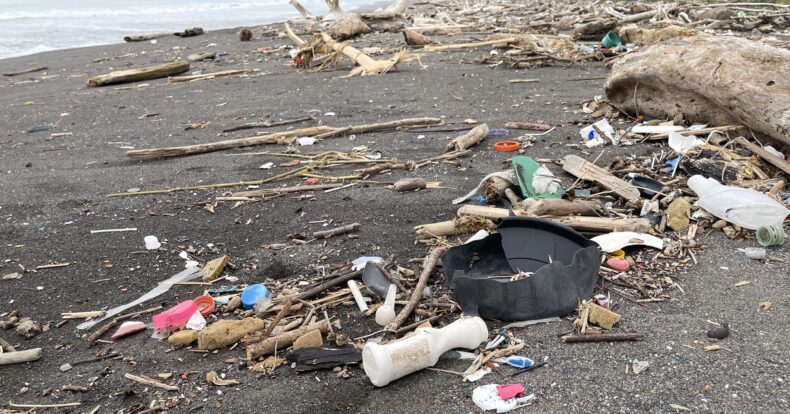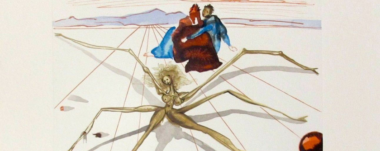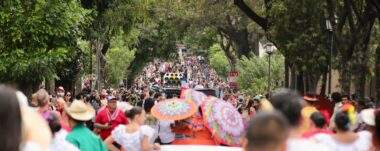Plastics and Oceans in Costa Rica

Are we drowning the oceans?
Sadly, we are drowning the oceans in plastics. According to a study by the Ellen MacArthur Foundation, IF WE DO NOT DO ANYTHING ABOUT IT, by 2050 there will be more plastic than fish in the sea. We created a very useful material to make our lives easier and more practical, but we forgot to think about how these products are going to be disposed of, and an extremely high percentage ends up in our oceans making it the large intestine of our planet and every year the consumption of plastics increases.
We protect what we love…
Human behavior has shown that we tend to protect only what we care about, so we must first understand why the oceans are so important to our lives.
1- The oceans serve as a CLIMATE REGULATOR, absorbing excess heat from the planet and regulating the effects of climate change by exchanging gases with the atmosphere.
2- The oceans PRODUCE most of the OXYGEN we have in the atmosphere, even more than the planet’s forests and jungles. Oxygen in 1 out of every 2 breaths is produced by the oceans!
Who generates so much plastic waste?
Where does all this plastic come from? From my house and yours, unfortunately, because we must be clear that in most countries we do not have adequate waste collection infrastructure. Most of the waste that we create with our massive consumption, ends up in the environment, with a high percentage in the oceans.
How do plastics reach the sea?
Most of it comes from rivers, which serve as direct conduits of garbage from cities to the marine environment.
Once they reach the sea, studies indicate that 70% of the plastics sink, 15% are left floating on the surface, and the remaining 15% in marine currents in mid-water.
What we are going to find on the beach today is brought by currents and reaches the beaches at high tides. Here we are only going to see the “tip of the iceberg” of all the plastic that has entered our oceans.
Facts about Costa Rica
With a population of less than 5 million inhabitants and according to 2017 data from the Ministry of Health, in Costa Rica alone we produce 564 tons of plastic waste DAILY. 522 tons of plastic end up in landfills and dumps and 42 tons end up in the environment daily. It is estimated that 13 garbage trucks correspond to the daily amount of plastic that enters Costa Rica’s oceans daily. We are talking about plastics that we all consume.
rpt
Global data
We currently produce about 300 million tons of plastic waste each year. This is almost equivalent to the entire weight of the entire human population.
Only 9% of all plastic waste produced has been recycled. About 12% has been incinerated, while the rest, 79%, has accumulated in landfills or in the environment.
A staggering 8 million tons of plastic ends up in the oceans each year.
Single-Use Plastics
Worldwide, 1 MILLION PLASTIC BOTTLES PER MINUTE and 5 billion disposable plastic bags per year are purchased. In total, 50% of all plastic produced is designed to be used once and thrown in the trash.
Single-use plastics are all plastic items that are used only once, usually with a fairly short life span, a high percentage of which are not recycled and therefore will take between 100 to 400 years to biodegrade.
MICROPLASTICS and the food chain
One of the biggest problems we are currently facing is MICROPLASTICS, those small pieces of plastic that have broken off from whole articles and become microparticles, down to bits and pieces as small as 5 mm in size. There are already studies that indicate that the plankton is consuming microplastics, which causes the plastic to enter the food chain until it reaches us and many other animals that die from its consumption, or simply their health is affected in different ways due to the heavy metals that the plastic attracts and the chemicals it contains.
But animals do not only consume microplastics. Every year more than 10 whales are killed due to the consumption of plastics of all kinds (bags, bottles, nets, fishing lines) and it is estimated that there are more than 600 species of animals affected by the consumption of plastics and more than 1 million animals die due to the consumption of plastics.
We are eating plastics!
We as a human species are already ingesting plastics. According to the latest studies, scientists have shown that the average human being is consuming the amount of plastic of a credit card per week! What does this mean?
Plastic attracts many heavy minerals and bacteria that can greatly affect our health. Early studies give indications of sterility problems as well as the possible cause of certain cancers.
There is still time!
The truth is that we must do something about it. It is vital to go out and clean up our beaches and oceans, but first, let’s look at this simple analogy: What would you do if you found the water overflowing from your bathtub at home?. Would you start collecting the water while the tube is still open, or would you close the tube first and then start collecting the water? We should all be aware and understand the importance of closing this “tube” of excessive consumption of single-use plastics (to begin with). Many times we believe that a straw, a plastic bag or a plastic cup that we accept is not going to make a big difference. What would happen if 6 billion inhabitants thought the same way? How many plastic products would we be consuming on a daily basis? That’s why I faithfully believe in the power of one. Everyone has the power to make lifestyle changes, and no matter how small they may seem, they are going to make a difference. It is not only the direct impact we can generate, but also the example we can create in our family and friends to change little by little for a life that generates less impact to the only planet that offers us all the conditions for us to live.
And what can I do?
The first thing is to REJECT all the SINGLE-USE PLASTICS we have already talked about.
Everything that is made or wrapped in plastic and that you cannot refuse, we must at least REDUCE its consumption.
What you managed to reduce but always consumed, we must do everything possible to REUSE itthem.
And finally, what we can no longer reuse, we must make ourselves responsible for their recycling. Why isn’t RECYCLING is not the most important formula? Unfortunately, globally, less than 9% of all plastics generated have been recycled. The infrastructure, the education on how to do it, and the fact that not all plastics are recyclable, mean that in many countries less than 2% is recycled.
The latest data shows that Costa Rica recycles around 7%.
Big results are produced with small changes.
Some tips to stop consuming single-use plastics:
Always carry with you:
a reusable bottle
reusable bags
a reusable straw
reusable cutlery
1 reusable container
Look for products that are not packaged in plastic.
Stop being part of “Fast Fashion” – much of the cheap clothing is made with polyester, which releases a lot of microfibers when washed that end up in the ocean. It is important to reduce consumption, repair and reuse what we already have.
Do not throw cigarette butts into the environment. A single cigarette butt can contaminate up to 50 liters of water and will take more than 10 years to degrade if an animal does not eat it before then.
Regeneration of the Oceans
In Costa Rica, for more than 4 years there have been many movements, associations and foundations dedicated to fight against all this plastic pollution by promoting and creating beach cleanups, both individually and as a group.
One example is 5 Minute Beach Cleanup, a movement that was born on social networks in 2016 from the inspiration of Carolina Sevilla when she returned to live in Santa Teresa, Costa Rica after several years of working at the United Nations. She decided to create an account under the name @5minutebeachcleanup and invite everyone, regardless of gender, language, social status, culture or beliefs, to take just 5 minutes to clean the beach. In just 1 year of creating the account, several digital media outlets from different regions of the world started to showcase thissuch initiative and the movement went viral, inspiring more than 30 daily beach cleanups worldwide.
In 2018, I offered all my collaboration to Carolina to go a little further and start working on closing that “open pipe” of plastic consumption, and that is how we co-founded the 5 Minute Beach Cleanup Foundation, with which we have developed several projects with a 100% educational approach.
If we all collaborate, we all benefit
Personally, I am creating a venture to be able to pay local organizations that work hard organizing beach cleanups with volunteers, as well as those coastal communities with inhabitants/fishermen who are in need of economic income, for the plastic they are able to collect. It is important that we all take responsibility for our actions, and that we all have the opportunity to collaborate in these great efforts across the country and the world. Anyone who feels the call to go a little further and help regenerate our oceans as an individual or as a company can contact me.
The real culprit?
By now you must still think that it is really the big companies that should be making the big changes. Of course, every company should be responsible for the plastic footprint it generates with its products. Many are already joining this big and necessary change, but many others still need to feel more pressure from their customers and consumers. That is why our individual actions are important, because as customers we can choose what we consume, as well as demand that the producers of what we buy look for more planet-friendly formulas.
The Power of One
All change begins with one, and each of us has the power to unleash a very big wave by our own example. The decision is up to each of us to start taking into account the health of the planet, and therefore, our own. We have all been part of the problem, but starting today, we can all be part of the solution!
In my nextthe following article, I will be presenting concrete solutions to this serious problem of plastic pollution in the oceans and the recycling of this material with examples of what is being done in Costa Rica, always with a view to exporting knowledge, experience and technology for the good of the planet.
Author: Mauricio Cortes E.
IG – mau.cortes.e
Navigate articles






